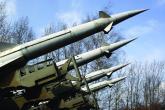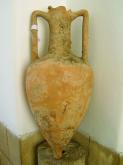×


We have detected your country as:
Please click here to go to the USA website or select another country from the dropdown list.

By Melissa Reagan, BFP Graphic Designer
{image_1} It was about a week and a half after first moving to Israel that my cell phone rang as I was at the Jerusalem Municipality waiting in line to get the water service turned on in my new apartment. I was pleasantly surprised to hear the soft, southern drawl of my former boss back in America. When I explained where I was and what I was doing, she replied, “I’m picturing camels lined up out front…”
Continue Reading »
{image_1} The hoopoe or Duchifat (in Hebrew) has been named Israel’s national bird after winning a majority vote by a landslide. President Shimon Peres made the announcement at a ceremony on May 29 to coincide with Israel’s 60th anniversary celebrations.
Continue Reading »
{image_1} It is only a matter of time before Hamas uses the long-range missiles capable of hitting Ashdod and Kiryat Gat, reported Israel’s internal security organization Shin Bet head Yuval Diskin. Diskin warned that until the Philadelphi corridor between Rafah and Egypt is totally sealed off, Hamas will continue to receive smuggled weapons, rockets, missiles, and other high quality weaponry.
Continue Reading »
{image_1} In April, G-Nius Unmanned Ground Systems unveiled to the press the Guardium UGV. Its goal is to “equip war fighters and law enforcers with systems that reduce combat friction and expedite decision cycles.” Straight from the Israeli Army operational laboratories, where it went through extensive operational trial and evaluation, the Guardium UGV revolutionizes the effectiveness of perimeter security.
Continue Reading »
{image_1} Acting on specific intelligence, the Theft Prevention Unit of the Israel Antiquities Authority (IAA) raided a home in Haifa recently where they discovered several hundreds of items, some of them unique and very valuable. According to the IAA, the items had been either stolen or acquired illegally and were going to be smuggled out of the country for sale abroad.
Continue Reading »
{image_1} A Palestinian rights group is charging that human rights abuses have increased in both the West Bank [Judea and Samaria] and Gaza Strip since Hamas routed Fatah in Gaza last year. The Palestinian Independent Commission for Citizens’ Rights (PICCR) charges that both Fatah and Hamas “use the law as a tool to justify practices and policies each side uses to challenge the other.” The group says that the abuses include torture and the deaths of prisoners in detention.
Continue Reading »
{image_1} The Jewish National Fund gave the Adulam Park to the State of Israel for its 60th anniversary, as reported in the Good News section of the last Dispatch from Jerusalem, the Jewish National Fund gave the Adulam Park to the State of Israel for its 60th anniversary. Since then, we have received further information about the park. Located near the Valley of Elah, where David fought Goliath, the park covers some 50,000 dunams (12,500 acres) and will be developed with bike and hiking trails and other outdoor activities.
Continue Reading »
{image_1} Palestinian Bedouin Nadia Aieed, 32, was bitten by a very poisonous saw-scaled viper. Her mother’s screams caught the attention of some Israeli farmers working nearby, who rushed her to a clinic. Within minutes, an Israel Defense Forces ambulance arrived with two paramedic soldiers dressed in military uniform, but the Palestinian women were desperate and gave it no thought. They just needed help—fast!
Continue Reading »
{image_1} The Israeli shekel joined the foreign exchange market’s CLS [Continuous Linked Settlement] Bank global settlement system on May 26, making it available for international payment instructions.
Continue Reading »
{image_1} Mahmoud Abbas (Abu Mazen), the President of the Palestinian Authority, is described by many as a moderate man. That assessment is based on the observation that he is rarely seen making inflammatory calls for violence and his public comments have, from time to time, opposed the murder of innocent people. In the international arena, his champions include US President George W. Bush and the former British Prime Minister Tony Blair. They insist Abbas is the appropriate partner for peace and have worked to establish that prospect in their advice to Israel.
Continue Reading »All logos and trademarks in this site are property of their respective owner. All other materials are property of Bridges for Peace. Copyright © 2025.
Website Site Design by J-Town Internet Services Ltd. - Based in Jerusalem and Serving the World.